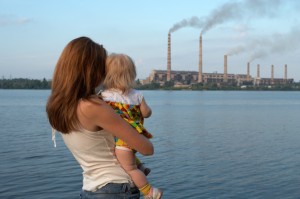David Kingman looks at the potentially malign impact that several of the measures announced during the 2014 Budget could have on the natural environment
As long ago as 2006, Conservative Party leader David Cameron was urging voters to “vote blue, go green”, claiming that he would put the environment at the centre of his policies if he got elected. When the Coalition was formed in 2010, it made a vow to become the “greenest government ever”, as part of a commitment to do as much as it could to address the threat of climate change.
However, the Government’s claims to be on the side of the environment were severely undermined by many of the measures contained in the Chancellor’s 2014 Budget speech, which has been dubbed by some commentators as a “return to dirty business as usual”. So where did the 2014 Budget speech go wrong?
Carbon floor freeze
The 2014 Budget speech contained a number of policy measures which have angered environmentalists. One of the most controversial moves was the announcement that the price of carbon under the Carbon Price Floor (CPR) will be frozen at £18 per tonne for four years from 2016.
The CPR is a form of carbon tax, introduced in 2013, which sets a minimum price for how much polluting industries which are based in Britain must pay to pollute per tonne of carbon. Industries which pollute in Britain already have to pay to purchase carbon permits under the European Union Emissions Trading Scheme (EU ETS), but the amount they have to pay can fluctuate; the idea of introducing this policy was to guarantee that they would have to pay a minimum price so that it would be easier for energy investors to forecast the long-term viability of renewable energy projects. The price was supposed to gradually increase in order to make renewable energy more viable, stimulating Britain’s transition towards becoming a low-carbon economy.
The Chancellor, George Osborne, argued that capping the price of carbon is necessary to stimulate Britain’s economy and save households money on their energy bills. It has been forecast that the move will save medium-sized manufacturers around £50,000 each per year on their energy bills, although typical households would probably only save as little as £15. Nevertheless, the Chancellor proclaimed:
“Today I have cut the cost of manufacturing in Britain…Half of the firms that will benefit most are in the north of England. A third are in Scotland and Wales. Thousands of jobs will be protected. A more resilient economy. A government on the side of manufacturers. A Britain that makes things again.”
The move has been criticised by environmental groups, who argue that it is a backwards step on Britain’s path towards generating carbon-free power by 2030; it will also make it more difficult for green investors to predict whether they should invest or not, and in the long run it is likely to make renewable energy less economic, increasing the demand for subsidies.
Other dirty deeds?
To its critics, the Budget also contained a number of other dirty deeds which are likely to reverse some of the progress which Britain has made in combating climate change.
Green investors have been angered by the small-but-significant decision to axe tax breaks under the Enterprise Investment Scheme for companies which benefit from the Renewables Obligation Certificate (ROC). This is likely to reduce future investment in clean solar and wind energy, saddling Britain with bigger costs in the long run for nuclear energy and coal.
This makes investing in Britain’s renewable energy sector even more difficult, according to Dan Lewis of think tank Future Energy Strategies:
“No wonder some utility analysts are starting to call the UK energy sector ‘uninvestable’. The paradox is that any simplification or benefit cut to Britain’s deep, multi-layered and overly complex energy policy framework means that even a small adjustment has major yes or no investment implications right across the board.”
Other Budget measures which were negative from an environment standpoint included exempting energy produced by combined heat and power plants from the carbon floor price altogether; scrapping a planned rise in fuel duty, and abolishing the two most expensive categories of Air Passenger Duty, a tax-break for aviation which could make tickets on some long-haul flights up to 10% cheaper.
Although a few policies were announced which might be of some environmental benefit – such as increasing the tax discount for ultra-low emission vehicles and giving extra money for improving Britain’s flood defences – it is hard not to see this Budget as being extremely negative in environmental terms. This will increase the burden on future generations, who are likely to have to pay for the costs of the damage caused by worsening climate change.
Of course, proponents of the Chancellor’s policies would argue that they are intended to boost Britain’s economy. In theory, this could help future generations to combat climate change by making them wealthier, so they have more money to spend on the costs of adaptation and mitigation. However, this seems like a reckless gamble to take with the futures of our children, who might one day blame the current generation for not acting when we had the chance to.
The current parliament may still have over a year left to run, but it appears that the Coalition Government will need to rapidly change the direction of its policies if it wants the promise to be the “greenest government ever” to amount to anything more than just hot air.
